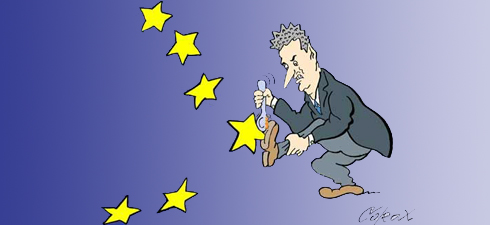He had not been long in his post as president of Serbia before Tomislav Nikolić understood that he would be much more comfortable in the opposition: now, each of his comments is dissected by the media. He has spoken three times and managed to affect relations with nearly all his neighbours.
He began by saying that Vukovar is a Serbian city to which Croats need not return. He then stated that he would not oppose independence for Montenegro but that he saw no difference between Serbs and Montenegrins. The final gaffe came when he claimed there was no genocide at Srebrenica thus provoking the anger of the Bosnians.
None of Nikolić's statements were made in a querulous or bellicose tone, on the contrary. Compared to the comments he has made in the past and which made him "famous", he must have made a major effort to build a new image as a peace-maker. But despite his efforts, scandals keep catching up to him, as if he cannot resist them.
Turned his anti-European vest
Asked by the Grand Mufti of Sandzak, Muamer Zukorlić, if he would visit Srebrenica and condemn the genocide, he replied "Probably not. President Boris Tadić [his predecessor] already visited Srebrenica and condemned the crimes committed there, I see no reason to revive the problem." He should have left it at that, but he didn't. "There was no genocide at Srebrenica. A 'grave crime' was committed the authors of which deserve to be arrested, tried and condemned," he added.
Nikolić had his first opportunity to act as Head of State on the day of his inauguration [May 31]. Less than 24 hours after being sworn-in, the press announced that NATO forces stationed in Kosovo (KFOR) had blocked roads in northern Kosovo with the aim of dismantling barrages put in place by local Serbs a few months ago in an attempt to block the deployment of Kosovar police and customs officials along the Serbian border. The emergency sirens went off again in North Kosovska Mitrovica and in the surrounding areas, in which Serbs are the majority, while local Serbs opposed the KFOR forces.
For years Nikolić criticised Tadić for being too soft on the Kosovo issue. When he took office, he turned his anti-European vest and became a supporter of Serbia's entry into the EU, while warning that Kosovo was a red line that he would never cross at any price. In a recent interview to Montenegro television, he repeated that he would not recognise Kosovo's independence even if that meant giving up Serbia's entry into the EU.
During his swearing in before the 250 new MPs of the Serbian National Assembly, and in taking his functions as supreme leader of the Serbian Army, he swore to concentrate all his forces "to maintain the sovereignty and the territorial integrity of the Serb Republic including Kosovo and Metohija, which are an integral part of it".
Dreams of Greater Serbia
Barely 20 hours later, the KFOR operation showed that Serbia was not quite sovereign on this part of its territory. And what did Nikolić do? The same thing Tadić would have done in his place. Local radio and television stations broadcast messages calling on Serbs living in the villages of North Kosovo to stay calm and to not attack the KFOR.
A turnabout? No, it is more a question of dealing with reality. It is easy to stir-up people's spirits with comments on Vukovar and Srebrenica by bringing up those wars that are behind us. Kosovo is a whole other problem.
After the Serbian elections, the head of Slovak diplomacy Miroslav Lajčák, came to Belgrade as the emissary of [EU commissioners] Catherine Ashton and Manuel Barroso. He brought the following message to Nikolić: normalised relations and renewed discussions with Kosovo are the essential condition to obtaining closer ties between Serbia and the EU.
Nikolić could have sent the army to help the Serbs who manned the barricades at Leposavić. He did not do so. No doubt even he has understood that proclaiming his dreams of Greater Serbia, be they feasible or not, is one thing while assuming the responsibilities of a Head of State is something else altogether.
Was this article useful? If so we are delighted!
It is freely available because we believe that the right to free and independent information is essential for democracy. But this right is not guaranteed forever, and independence comes at a cost. We need your support in order to continue publishing independent, multilingual news for all Europeans.
Discover our subscription offers and their exclusive benefits and become a member of our community now!












